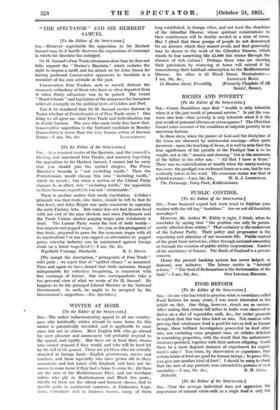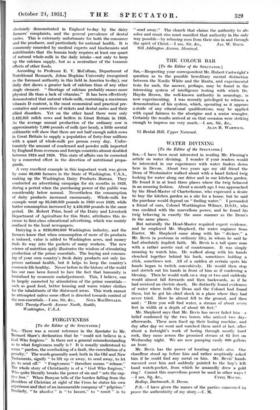[To the Editor of the SPECTATOR.) SIR,—That the average individual
does not appreciate the importance of natural whole-mflk as a single food is only ton obviously demonstrated in England to-day by the dairy farmers' -complaints, and the general prevalence of dental caries. This is extremely unfortunate for both the consumer and the producer, and particularly for national health. It is commonly conceded by medical experts and biochemists and nutritionists that the human body requires at least one quart of natural whole-milk in the daily intake—not only to keep up the calcium supply, but as a neutralizer of the toxamic effects of other foods.
According to Professor E. V. McCollum, Department of Nutritional Research, Johns Hopkins University (recognized as the foremost authority in this field in America to-day), our daily diet shows a greater lack of calcium than of any other single element. " Shortage of calcium probably causes more physical ills than a lack of vitamins." It has been effectively demonstrated that natural whole-milk, containing a maximum vitamin D content, is the most economical and practical pre- ventative and corrective of rickets and dental caries and their allied disorders. Yet on the other hand there were only 2,422,321 milch cows and heifers in Great Britain in 1928. As the average annual production of the ordinary cow is approximately 7,000 pounds of milk (per head), a little mental arithmetic will show that there are not half enough milch cows in Great Britain to supply a population of forty-four millions with a quart of whole-milk per person every day. Unfor- tunately the amount of condensed and powder milk imported by England from overseas and foreign countries almost doubled between 1924 and 1928. This state of affairs can be corrected by a concerted effort in the direction of nutritional propa- ganda.
A very excellent example in this important work was given by some 60,000 farmers in the State of Washington, U.S.A., making up the Washington Dairy Products Bureau. They conducted an advertising campaign for six months in 1929, during a period when the purchasing power of the public was considerably below normal. Nevertheless the consumption of dairy products increased enormously. Whole-milk for example went up 93,940,939 pounds in 1930 over 1929, while butter consumption increased by 4,456,930 pounds in the same period. Dr. Robert Prior, head of the Dairy and Livestock Department of Agriculture for this State, attributes this in- crease to first-class educational advertising, which was mainly confined to the local newspapers.
Dairying is a $220,000,000 Washington industry, and the farmers know that when consumption of more of its products is induced, value is added to Washington acres, and money finds its way into the pockets of many workers. The new science of nutrition aptly illustrates the wisdom of stimulating production of the prime essentials. The buying and consum- ing of your own country's fresh dairy products not only im- proves national health, but it helps to keep the country's economic life healthy. Never before in the history of the world has our race been forced to face the fact that humanity is brutalized by economic maladjustment. This, I believe, can be largely corrected by stimulation of the prime essentials— such as good food, better housing and warm winter clothes for the inhabitants of the distressed areas. This work cannot be attempted unless some effort is directed towards control of















































 Previous page
Previous page